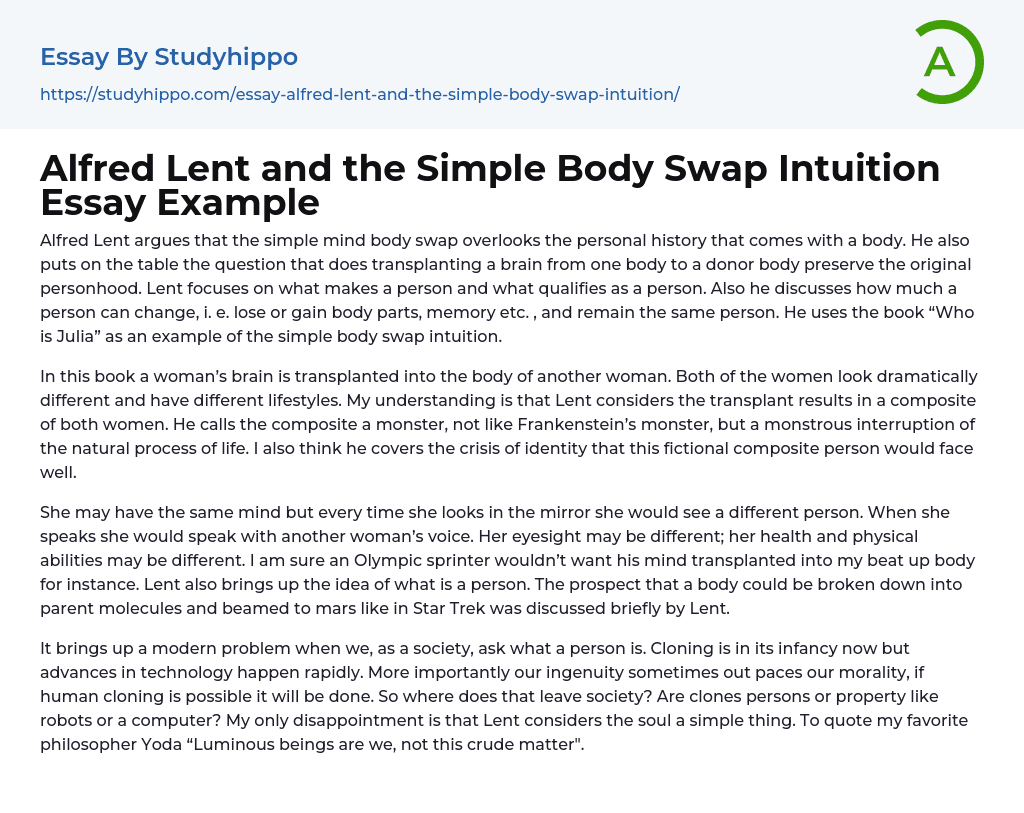

Alfred Lent and the Simple Body Swap Intuition Essay Example
Alfred Lent argues that the simple mind body swap overlooks the personal history that comes with a body. He also puts on the table the question that does transplanting a brain from one body to a donor body preserve the original personhood. Lent focuses on what makes a person and what qualifies as a person. Also he discusses how much a person can change, i. e. lose or gain body parts, memory etc. , and remain the same person. He uses the book “Who is Julia” as an example of the simple body swap intuition.
In this book a woman’s brain is transplanted into the body of another woman. Both of the women look dramatically different and have different lifestyles. My understanding is that Lent considers the transplant results in a composite of both women. He c
...alls the composite a monster, not like Frankenstein’s monster, but a monstrous interruption of the natural process of life. I also think he covers the crisis of identity that this fictional composite person would face well.
She may have the same mind but every time she looks in the mirror she would see a different person. When she speaks she would speak with another woman’s voice. Her eyesight may be different; her health and physical abilities may be different. I am sure an Olympic sprinter wouldn’t want his mind transplanted into my beat up body for instance. Lent also brings up the idea of what is a person. The prospect that a body could be broken down into parent molecules and beamed to mars like in Star Trek was discussed briefly by Lent.
It
brings up a modern problem when we, as a society, ask what a person is. Cloning is in its infancy now but advances in technology happen rapidly. More importantly our ingenuity sometimes out paces our morality, if human cloning is possible it will be done. So where does that leave society? Are clones persons or property like robots or a computer? My only disappointment is that Lent considers the soul a simple thing. To quote my favorite philosopher Yoda “Luminous beings are we, not this crude matter".
- Human Skin Color essays
- Digestive System essays
- Unconscious Mind essays
- Age Of Enlightenment essays
- Ethos essays
- Time essays
- Acceptance essays
- Meaning Of Life essays
- Reality essays
- Natural Law essays
- Political Philosophy essays
- Utilitarianism essays
- Existence essays
- Free Will essays
- Good And Evil essays
- Confucianism essays
- Relativism essays
- Conscience essays
- Environmentalism essays
- Empiricism essays
- Epistemology essays
- Ethics essays
- Existentialism essays
- Human Nature essays
- Individualism essays
- Metaphysics essays
- Philosophy Of Life essays
- Transcendentalism essays
- Truth essays
- Destiny essays
- Determinism essays
- Fate essays
- Functionalism essays
- Philosophers essays
- Pragmatism essays
- Future essays
- Child Observation essays
- Critical Reflection essays
- Teaching Philosophy essays
- Personal Philosophy essays
- Action Speak Louder Than Words essays
- Can Money Buy Happiness essays
- Values of Life essays
- Ethical dilemma essays
- Normative Ethics essays
- Virtue Ethics essays
- Belief essays
- Deontology essays
- Moral essays
- Virtue essays



